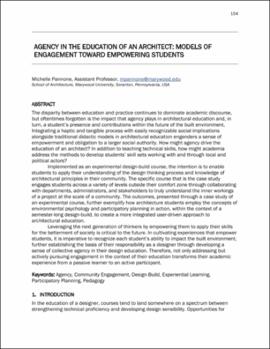| dc.contributor.author | Pannone, Michelle | |
| dc.date.accessioned | 2022-03-23T20:44:55Z | |
| dc.date.available | 2022-03-23T20:44:55Z | |
| dc.date.issued | 2022 | |
| dc.identifier.citation | Pannone, Michelle, "Agency in the Education of an Architect: Models of Engagement Toward Empowering Students," in Person, Angela M., Anthony Cricchio, and Stephanie Z. Pilat, eds. 2022. Proceedings of Schools of Thought: Rethinking Architectural Pedagogy, Norman, Oklahoma, March 5-7, 2020. University of Oklahoma Libraries: ShareOK. | |
| dc.identifier.uri | https://hdl.handle.net/11244/335065 | |
| dc.description | This paper was presented at the 2020 Schools of Thought Conference hosted by the Christopher C. Gibbs College of Architecture at the University of Oklahoma. | |
| dc.description.abstract | The disparity between education and practice continues to dominate academic discourse, but oftentimes forgotten is the impact that agency plays in architectural education and, in turn, a student’s presence and contributions within the future of the built environment. Integrating a haptic and tangible process with easily recognizable social implications alongside traditional didactic models in architectural education engenders a sense of empowerment and obligation to a larger social authority. How might agency drive the education of an architect? In addition to teaching technical skills, how might academia address the methods to develop students’ skill sets working with and through local and political actors? Implemented as an experimental design-build course, the intention is to enable students to apply their understanding of the design thinking process and knowledge of architectural principles in their community. The specific course that is the case study engages students across a variety of levels outside their comfort zone through collaborating with departments, administrators, and stakeholders to truly understand the inner workings of a project at the scale of a community. The outcomes, presented through a case study of an experimental course, further exemplify how architecture students employ the concepts of environmental psychology and participatory planning in action, within the context of a semester-long design-build, to create a more integrated user-driven approach to architectural education. Leveraging the next generation of thinkers by empowering them to apply their skills for the betterment of society is critical to the future. In cultivating experiences that empower students, it is imperative to recognize each student’s ability to impact the built environment, further establishing the basis of their responsibility as a designer through developing a sense of collective agency in their design education. Therefore, not only addressing but actively pursuing engagement in the context of their education transforms their academic experience from a passive learner to an active participant. | |
| dc.language.iso | en_US | |
| dc.relation.ispartof | 2020 Schools of Thought Conference | |
| dc.relation.uri | https://hdl.handle.net/11244/335058 | |
| dc.rights | CC BY-NC-SA | |
| dc.rights.uri | https://creativecommons.org/licenses/by-nc-sa/4.0/ | |
| dc.subject | agency | |
| dc.subject | community engagement | |
| dc.subject | design-build | |
| dc.subject | experiential learning | |
| dc.subject | participatory planning | |
| dc.subject | pedagogy | |
| dc.subject | architectural education | |
| dc.title | Agency in the Education of an Architect: Models of Engagement Toward Empowering Students | |
| dc.type | Article | |
| dc.description.peerreview | Yes | |
| dc.identifier.doi | 10.15763/11244/335065 | |
| ou.group | Christopher C. Gibbs College of Architecture | |


